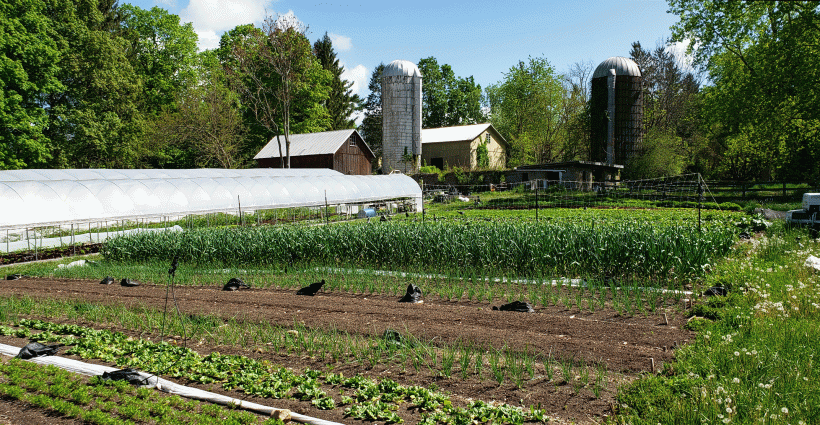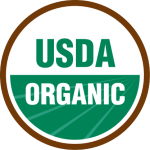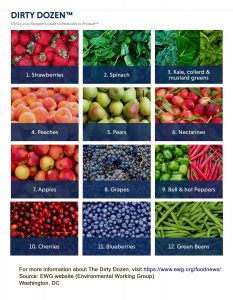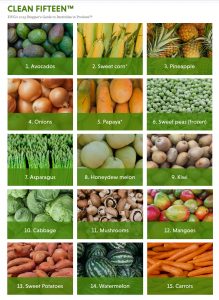designed for the way women work.

The Dirty Dozen of Produce, or Why You Should Buy and Grow Organic, by Dorian Winslow
Category: Plant Ideas & Info, Presenting "The Curious Gardener", Strong Women Building A Gentle World
The Dirty Dozen and Clean Fifteen–
It’s not always easy to find organically grown produce, but one nonprofit group called The Environmental Working Group (EWG) has compiled a list of the 12 fruits and vegetables that are the most pesticide-contaminated and are to be avoided if they’re not organically grown. The group updates the list of the Dirty Dozen every year.
The list includes strawberries, spinach, kale/collard and mustard greens, peaches, pears, nectarines, apples, grapes, bell and hot peppers, cherries, blueberries and green beans. Click on the list below to print it out, or click the link provided to visit the EWG website for more information.
Recognizing that organically grown produce is not always an option due to cost and accessibility, EWG also publishes a list called the Clean Fifteen, which are those fruits and vegetables they tested that have the lowest amount of pesticide residues. The list includes avocadoes, sweet corn, pineapple, onions, papaya, sweet peas (frozen), asparagus, honeydew melon, kiwi, cabbage, mushrooms, mangoes, sweet potatoes, watermelon and carrots. See the list below in a printable pdf, or click the link provided to visit the EWG website for more information.
You can read more about the Environmental Working Group at the end of this article.
What does organic mean?
According to NOFA (Northeast Organic Farming Association), “the primary goal of organic agriculture is to optimize the health and productivity of interdependent communities of soil life, plants, animals and people.”
Many small farms follow sustainable practices even if they’re not certified organic, and if you’re buying your produce at a local farmers market or CSA you can engage the farmer to learn more about their practices.
Produce that is sold as ‘certified organic’ by the USDA, though, requires adherence to a strict set of rules and regulations that dictate every step along the way, from growing to processing to handling. Everything is monitored from seed to sale.
Starting with seeds, they must be collected from plants that have been raised and grown organically.
Synthetic fertilizers, most commercial pesticides and herbicides are forbidden.
Organic fertilizers are allowed, including alfalfa meal and fish emulsion.
You can use composted poultry and animal manure if they are aged and come from organic farms.
Maple View Farm, Certified Organic
I reached out to a farm near me that recently got its certification as an organic farm. Kyle Nisonger is proprietor of Maple View Farm in Poughquag, in Dutchess County, the breadbasket of NY State. The photo above was taken at his farm.
It’s winter now and Kyle only got his certification in November. The paperwork was submitted last spring, his inspection was in July, but the certification didn’t come through until the very end of the year. He doesn’t think he could have gotten through it if a good friend hadn’t stepped in to help him over the finish line.
Kyle was already practicing sustainable agriculture, but now it’s official and he can use the “Certified Organic” label on his products. Will it have been worth it? Kyle thinks so.
Kyle’s plot is small, just 2/3 of an acre of growing space including a greenhouse with some state of the art features. But he wants to be smarter about the business side of things and that includes thinking about marketing. He’s hearing more consumers ask for organic foods.
Kyle started his small scale, no till farm in 2017. He grows his crops year round in caterpillar tunnels, which are like hoop houses, and one greenhouse. He has a climate battery in his greenhouse that helps regulate the air temperature through underground tubes. In the summer when temperatures in the greenhouse rise, the heat circulates underground and then is released at night after temperatures drop.
He grows Leafy greens: Salad greens, baby greens, spinach, baby kale, arugula; tomatoes, cucumbers, carrots, radishes, green onions; herbs such as cilantro, parsley, dill; and micro greens.
His customers include a local, year round farmers market called the Pleasantville Farmers Market, Nature’s Pantry in Fishkill, a couple of restaurants and his own summer farmstand and CSA.
What is EWG?
Since 1993, the Environmental Working Group has, in its own words. ‘shined a spotlight on outdated legislation, harmful agricultural practices and industry loopholes that pose a risk to our health and the health of our environment.
Whether it’s on Capitol Hill or in communities across America, we make our voices heard, changing the debate over environmental health and putting the most important people – you and your family – at the center of the conversation.’
Why Organic?
We first learned about the Dirty Dozen and EWG when a friend recommended “The Cancer-Fighting Kitchen” after I was diagnosed with breast cancer last summer. Ponder this question posed by the author of the cookbook: “Why would you opt for food raised with commercial pesticides, additives, and artificial color and flavoring if you have a better choice?”
For more information about EWG and the Dirty Dozen and Clean Fifteen, click here: https://www.ewg.org/foodnews/ Scroll down to open up the lists and read more. EWG also tested another 19 fruits and vegetables that fall somewhere in between the two lists. They include tomatoes, cucumbers and broccoli.





Interesting article Dorian. Good luck with your cancer treatments.
Thank you, Dorian. You are now my key “go to” for quality products and important info that I don’t see anywhere else.
Great article Dorian! I’m glad this information is getting out there. We’ve been supporting organic farming through buying and eating organic food for 35 years. Regenerative agriculture is SO important. Thank You!
Dorian, unfortunately you didn’t know or purposely left out, as does EWG, most important info about pesticides on fruits and veggies. EPA is federal agency (by law, FIFRA) that regulates the sale and use of all pesticides in US. EPA has stringent and specific science requirements manufacturers must meet (100-120 studies) to characterize a pesticide’s potential risks to humans and the environment. EPA will allow a pesticide to be used only if EPA decides, after a rigorous assessment that is shared with the public, that the proposed use(s) meet EPA’s very conservative safety standards. EPA sets maximum residue levels (tolerances) for each pesticides-crop combo…usually 1 ppm. But, actually the levels at the grocery store are orders of magnitude less (0.01 to ppbs). epa.gov/pesticides
Retired career EPA pesticide manager.
Thank you for sharing this good information. Are all grocery store levels below the EPA’s standard of 1ppm?